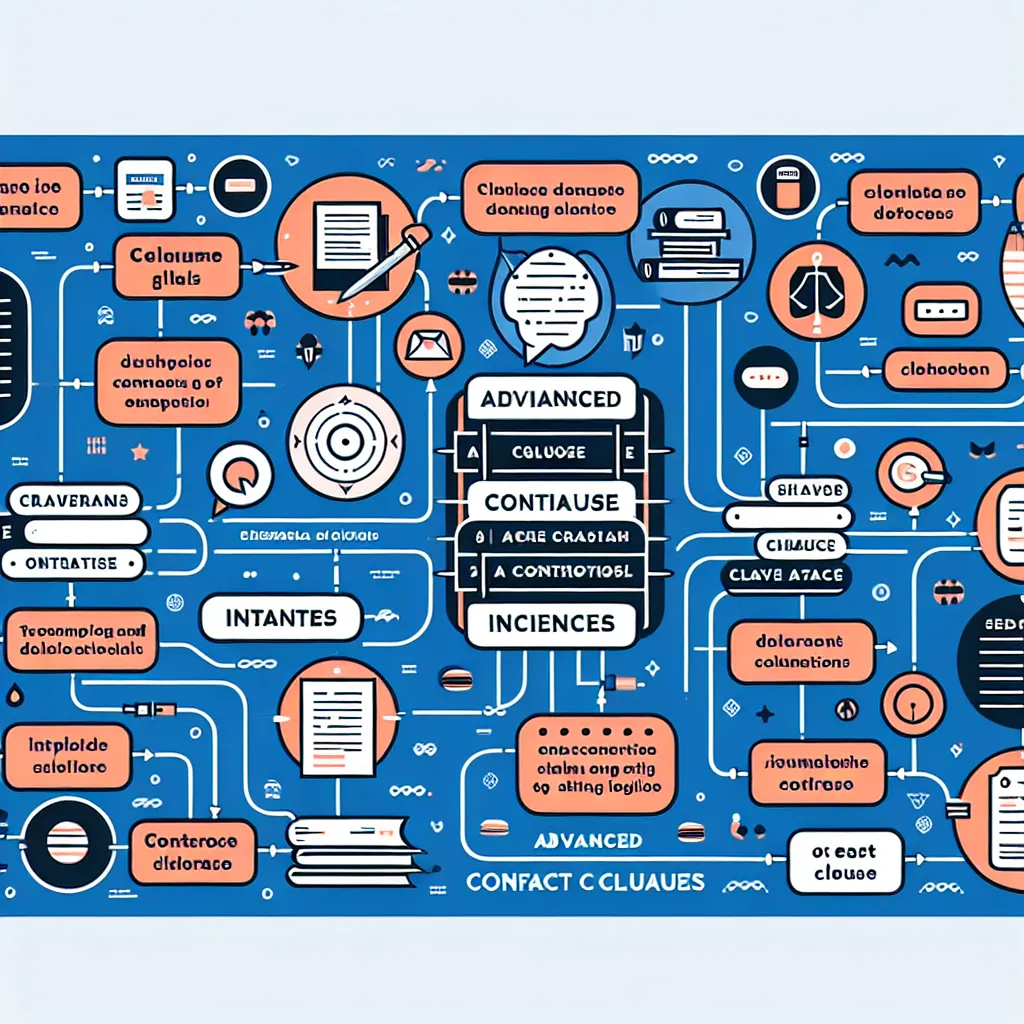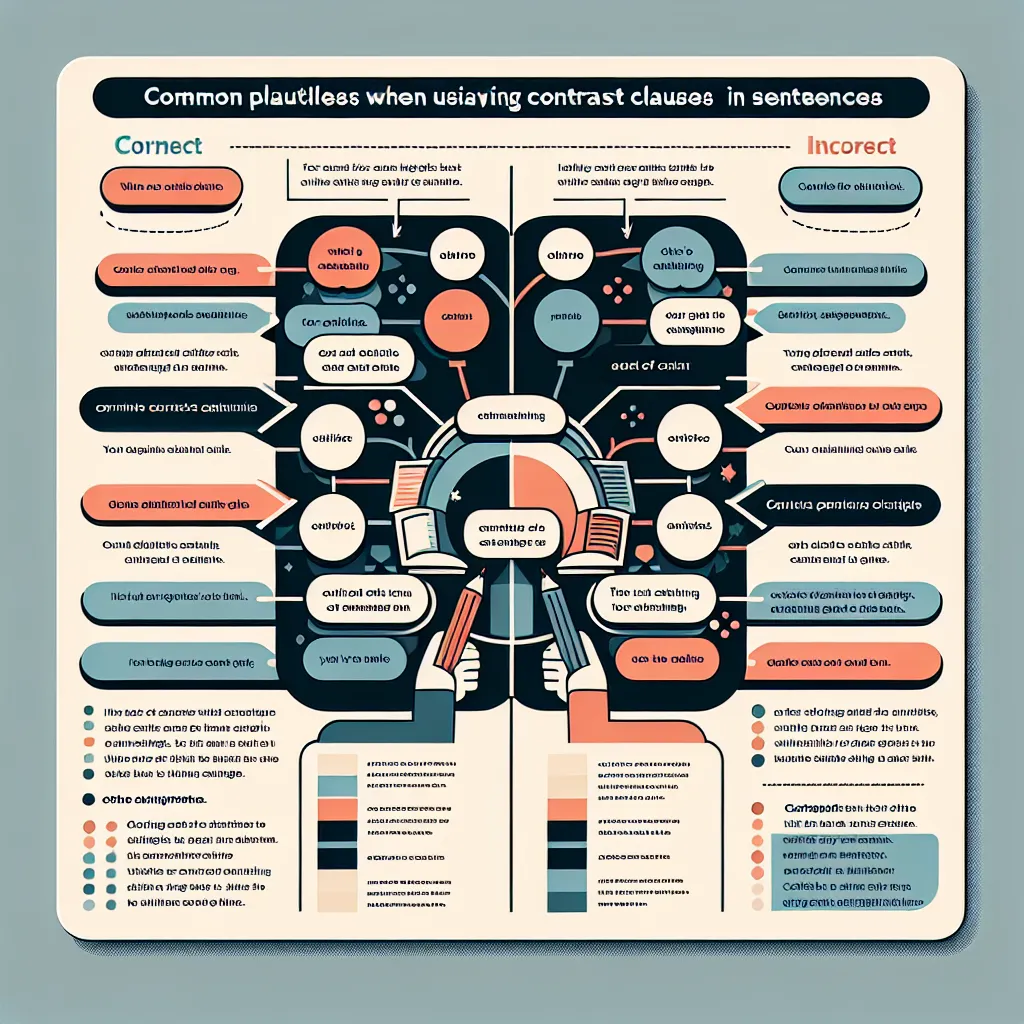Advanced contrast clauses are essential tools for expressing complex ideas and relationships in English. They allow writers and speakers to compare and contrast information more effectively, adding depth and nuance to their communication. This guide will explore the various types of advanced contrast clauses, their usage, and provide practical examples to help you master this important aspect of English grammar.
Understanding Advanced Contrast Clauses
Contrast clauses are used to show differences or unexpected relationships between ideas. While basic contrasting conjunctions like “but” and “however” are commonly used, advanced contrast clauses offer more sophisticated ways to express complex comparisons.
Types of Advanced Contrast Clauses
-
Although / Even though / Though
These conjunctions introduce a subordinate clause that contrasts with the main clause.
Example: “Although the weather was terrible, we still enjoyed our vacation.” -
Despite / In spite of
These prepositions are followed by a noun or gerund to express contrast.
Example: “Despite the heavy traffic, we arrived on time.” -
Whereas / While
These conjunctions are used to show a direct contrast between two clauses.
Example: “Whereas John prefers coffee, Sarah always chooses tea.” -
Nevertheless / Nonetheless
These adverbs are used to show that something is true despite what was previously stated.
Example: “The task seemed impossible. Nevertheless, we decided to try.”
 Advanced contrast clauses diagram
Advanced contrast clauses diagram
How to Use Advanced Contrast Clauses Effectively
To use advanced contrast clauses effectively, consider the following tips:
-
Choose the right clause for the context: Different contrast clauses have subtle differences in meaning and usage. For example, “although” is more formal than “though,” and “despite” is stronger than “in spite of.”
-
Pay attention to sentence structure: Some contrast clauses require specific grammatical structures. For instance, “despite” is followed by a noun or gerund, while “although” introduces a full clause.
-
Use punctuation correctly: When a contrast clause begins a sentence, it’s typically followed by a comma. For example: “Although it was raining, we went for a walk.”
-
Avoid redundancy: Don’t use multiple contrast words in the same sentence. For example, “Although it was raining, but we still went out” is incorrect.
-
Practice with real-world examples: Reading authentic materials and listening to native speakers can help you understand how these clauses are used naturally.
Examples in Context
Let’s look at some examples of advanced contrast clauses in various contexts:
-
Academic writing:
“While the experiment yielded promising results, further research is needed to confirm the findings.” -
Business communication:
“Despite the economic downturn, our company managed to increase profits by 5%.” -
Literary analysis:
“Although the protagonist faces numerous challenges, she remains optimistic throughout the novel.” -
Everyday conversation:
“Even though I’m not a fan of horror movies, I enjoyed watching that one with you.”
Common Mistakes to Avoid
When using advanced contrast clauses, be aware of these common pitfalls:
-
Misusing “while”: Remember that “while” can also mean “during.” Be sure the context clearly indicates contrast.
Incorrect: “While I like pizza, I ate a salad.” (This could mean “during the time I like pizza”)
Correct: “While I like pizza, I prefer pasta.” -
Forgetting the main clause: Ensure that your sentence includes both the contrast clause and a main clause.
Incorrect: “Although it was raining heavily.”
Correct: “Although it was raining heavily, we decided to go for a walk.” -
Using double negatives: Avoid using two negative statements when contrasting ideas.
Incorrect: “Although he didn’t dislike the movie, he didn’t enjoy it.”
Correct: “Although he didn’t dislike the movie, he didn’t find it particularly enjoyable.”
 Common mistakes in using contrast clauses
Common mistakes in using contrast clauses
Exercises to Improve Your Skills
To master the use of advanced contrast clauses, try these exercises:
-
Sentence combining: Take two simple sentences and combine them using an appropriate contrast clause.
Example:- It was raining. We went for a walk.
- Although it was raining, we went for a walk.
-
Rewriting practice: Rewrite sentences using different contrast clauses to express the same idea.
Example:- Despite the rain, we enjoyed our picnic.
- Even though it was raining, we enjoyed our picnic.
- We enjoyed our picnic, nevertheless it was raining.
-
Gap-filling exercises: Complete sentences with the appropriate contrast clause.
Example:- ____ the high price, the product is very popular. (Despite/Although/Whereas)
-
Error correction: Identify and correct mistakes in sentences using contrast clauses.
Example:- Incorrect: Although it was expensive, but we bought it anyway.
- Correct: Although it was expensive, we bought it anyway.
For more advanced practice on related topics, you might find our guide on how to use advanced sentence connectors helpful.
Conclusion
Mastering advanced contrast clauses is a crucial step in developing sophisticated English language skills. By understanding the nuances of different contrast clauses and practicing their usage, you can express complex ideas more clearly and effectively. Remember to choose the appropriate clause for your context, pay attention to sentence structure, and avoid common mistakes. With consistent practice and exposure to authentic language use, you’ll soon find yourself using these advanced grammatical structures with confidence.
To further enhance your English grammar skills, consider exploring our article on mastering advanced conjunctions, which complements the use of contrast clauses in creating more complex and nuanced sentences.




